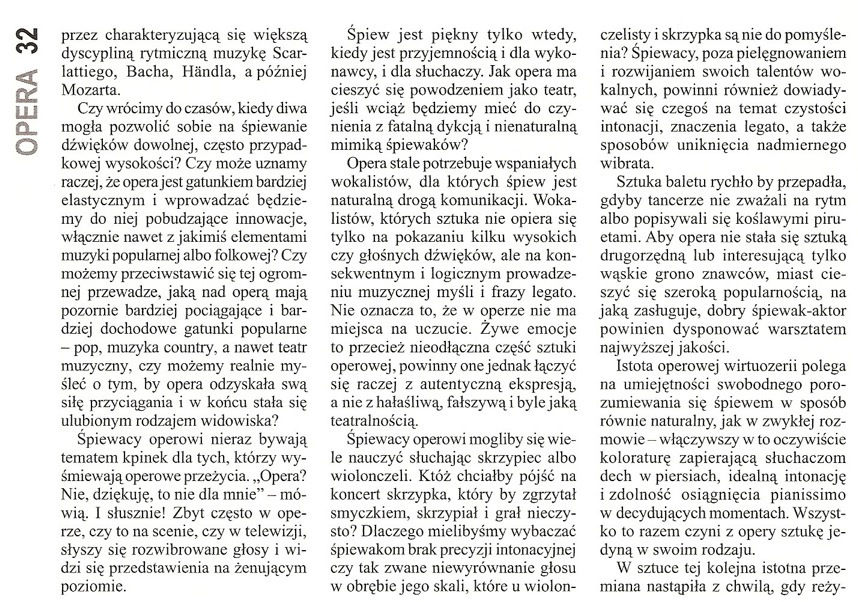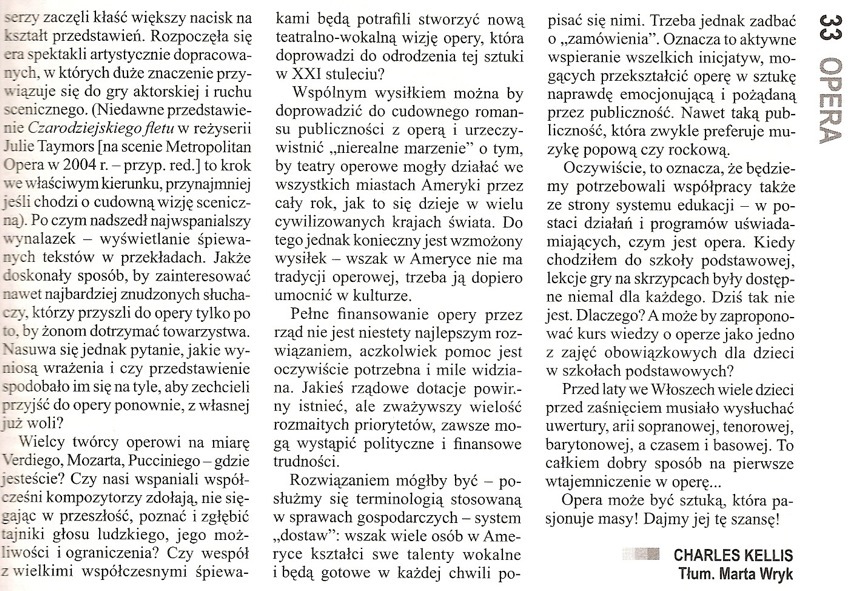CHARLES KELLIS


TWOJA MUZA (October/November) 2013/ English


GIULIO CESARE
by Charles Kellis
Opera in the baroque era, despite having had an earlier reputation of being "bland with passive emotions", has actually now developed into being regarded as expressively engaging ---weaving gracefully through recitatives into stylistically produced da capo arias ---each maintaining a life of their own, yet still managing to cohesively connect to the complete operatic objective. Regardless of some of the show-stopping, virtuosic gems of ornamentation within the repeated sections, ---literally freezing the action--- the leading characters, thru these stylistic arias, should still be able to intimately share their basic emotions and innermost feelings.
David McVicars has taken this long Handel opera from the 18th Century and ---imposing his own visionary image of modernity--- made it come alive with a lot of little surprises.
If you are a purist, hoping for the most traditional rendition of an historically correct "Giulio Cesare", you might be disappointed with some of the campy, almost burlesque style that permeated the atmosphere of this production. If, however, you are happy with newly conceived, cleverly designed versions, you could certainly be pleased with this account of Giulio Cesare. It introduces a mixture of emotions, punctuated by some rather campy frivolity. The unusually clever, well coordinated choreography included every trick of the trade: exotic dancing with delightfully designed collective body language, some interspersed effectively enhanced "tai chi" and even a take on the Radio City Rockets. These were all obvious attempts to keep this very long opera, despite its array of gorgeous, repetitive arias, from the possibility of becoming tedious.
McVickars seemed to be interpolating his own views of the18th century inequity, surrounding the classes of ultra nobility juxtaposed on the rest of the populace who were literally starving to death. Either you were part of the ruling class or you were destined to a life of extreme hardship. That eventually led to the French Revolution. It was to this prevailing history, that McVickars seemed to be directing his version of this serious drama ---interspersed with enhanced broadway style comedy. Much of the action in this "Giulio Cesare" seemed to be his response to the "vice and folly" of that era. Some of the comedic, athletic and precisely timed organization of gimmickry was his way of pocking fun at the reigning aristocracy of the 18th century.
One could ask, why are we superimposing such frivolous activity on such an obvious musical masterpiece? Well, the answer could be variable, but the most immediate answer became evident by the reaction of the audience, They loved it!
Huge ovation! Is that a valid enough reason? Well, in terms of the recent Gelb crusade of popularizing opera and bringing it closer to those who unfortunately may still think of it as wobbly yelling that has too long suffered ridicule in a caricature of imitation ---it may be a most immediate remedy.
Often theatrically revised from its historical origin, this account finds Caesar, having pursued Pompey to the shores of Egypt, being handed the severed head of Pompey by Ptolemy, the-ruler of Egypt, (bloodily visible on a large platter). Cleopatra, Ptolemy's sister and co-ruler of Egypt, sung by the colorful Natalie Dessay, cleverly wins the affection of Caesar who is overwhelmed by her beauty. Cornelia, the wife of Pompey, together with her son Sesto, vow vengeance for his murder. After a suspenseful period, with the inclusion of many affecting, wonderfully heartfelt da capo arias, Cornelia and her son get their revenge ---while Caesar and Cleopatra as depicted in a Hollywood-like ceremonial ending--- "live happily ever after".
From a theatrical standpoint, this was surprisingly fine tuned with highly applaudable comedic timing. The scene of introducing undulating waves to indicate the ocean with warships was already a harbinger of what was to come. Cleaning the floors with modern cleaning equipment also added to the coming frivolity, clearly indicating right at the outset that this production would not be following the ordinary conventions of Baroque correctness.
The very fact that this opera invoked a matriarchal, exclusively quasi female vocal input with only one "token" baritone thrown in and with one other hardly visible, together with the inclusion of a falsetto Julius Caesar--- is already ample evidence of comedy. The traditional inclusion of an abundance of repeated da capo arias surviving almost five hours--- regardless of the intrinsic beauty of the music--- also begs for a touch of comedy. It was opera seria stretched to its limits with a growing danger of becoming (I'm biting my tongue as I say it). Ouch, I said it ---boring. Three hours at a time of beautiful vocalizing, perhaps even four could be rewarding enough, but five hours of constantly repetitious variations on rather familiar themes, regardless that one could still basque in the luxury of this appealing music ---heard through a constant barrage of female type voices, feels in need of some measure of relief.
Having had a background as an actress and dancer before becoming an opera star, Natalie Dessay had to be the most appealing choice for this particular production.
Her portrayal fit organically into McVickars's double edged vision of Cleopatra. Part, early 1900's "Great Gatsby" flapper, part Indian sign language dancer, part burlesque queen, even partaking in a feigned Can-Can version of the Radio City Rockets. She proved to be a master of comedic integration together with an incredible ability to move like a seasoned acrobatically nuanced exotic dancer. This was highlighted by her synchronized movements, perfectly interacting with a trio of dancers. The timing could not have been better coordinated, as was also the foot stomping precision of Caesar's Army, all dressed up in Red British uniforms. They appeared adjacent to the Egyptian soldiers who were in a basically disorganized mixture of Arabic, Egyptian and Muslim attire.
It is worth attending this performance even just to watch Dessay's unusual versatility. The stagecraft was close to fabulous. Her singing, however, was often questionable with lapses of pitch and overall vocal unsteadiness ---except for the moments when she came to the aria, "Piangero la sorte mia". There she seemed, in some choice phrases, to be a little more controlled. The Baroque cadenzas in the repeated "A" section were strategically well chosen and for a few moments, her voice almost took on the quality I mostly remember in her famous Lucia, a few years ago. Fortunately, as she is also quoted saying, "the orchestra was reduced to a bare minimum in the Baroque tradition and there was no need to have to yell to be heard over a complete, full orchestra". Despite some overall vocal insecurity, her 21st century comedically theatrical Cleopatra still came off with a well deserved, large ovation from the audience.
As for Mr. Daniels, I can say that I have respect for anyone able to handle very difficult Handel fioritura well enough to be even acceptable. He proved to be mostly adept and musically enlightened. His voice has a reputation of being a strong Handel contra-tenor. What I heard in this production was a rather secure technique that allowed many fanciful flights into mostly secure terrain. What, however, was not able to be hidden is what no counter-tenor is able to conceal. A middle range gap of an unintentional outbreak of ---hard to overcome falsetto weakness. You can only fight nature up to a point. Nature exposes any attempts at subterfuge. Although Daniels is more capable than most counter-tenors of uniting his registers, I still hear that unmistakable fake falsetto quality that has always been considered to be a problem in the true tenor voice. Without any more castrati around, the term countertenor was born ---actually a cultivated falsetto. To become a counter tenor requires the use of a full throttled falsetto. No easy task, but once achieved, the easier capacity for agility might be rewarding enough.
The rest of the cast was also secure in their respective roles. Cornelia sung by Patricia Bardon, despite some early insecurity, displayed a thorough grasp of the dramatic intentions of revenge. Alice Coote as Sesto, her son, was often impressive, particularly when she displayed some gracefully imbued coloratura. She seems to increasingly be well known in pants roles and with good reason. The only significant role displaying a masculine voice was Achillas, vividly portrayed by Guido Loconsolo. It was such a relief to hear a real man singing that, not withstanding any possible misgivings, he was absolutely pleasureful to hear in contrast to the entrapment of a feminine collection of treble vibrations. The counter-tenor Christophe Dumaux was another reasonably astute actuator of a secure falsetto technique that accounted for his role as Ptolemy, the ruler of Egypt who was seen as a comically dressed muslim Egyptian King with a big mustache.
Overall, in this Julius Caesar, regardless that the original intent may have been somewhat marginalized into a semi-broadway type innovation, Handel's glorious music still triumphed in its unmistakable style of one amazingly beautiful aria after another. They just kept coming on. And on and on and on.
FINE




